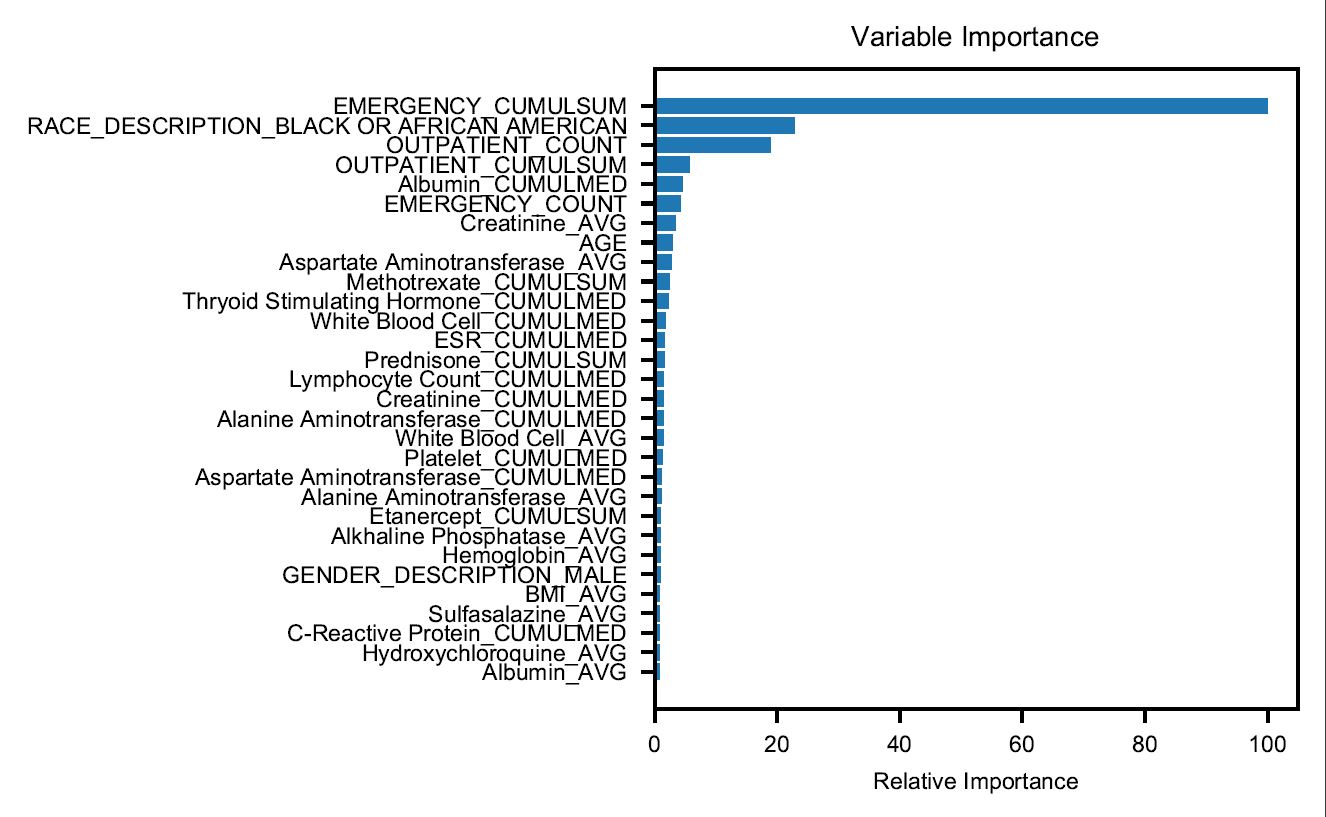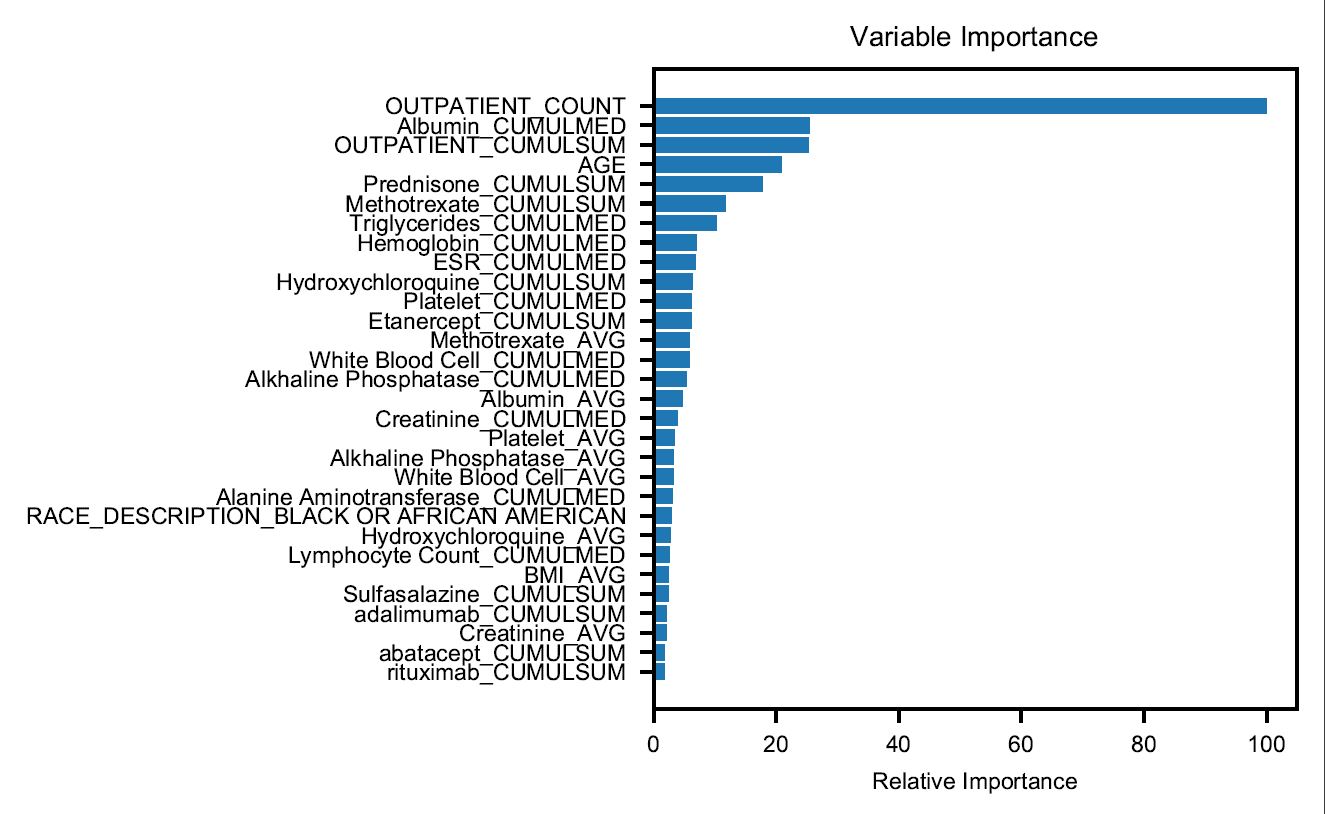Session Information
Date: Monday, November 9, 2020
Title: RA – Diagnosis, Manifestations, & Outcomes Poster IV: Lifespan of a Disease
Session Type: Poster Session D
Session Time: 9:00AM-11:00AM
Background/Purpose: Despite recent advances in therapy, 42% of patients with rheumatoid arthritis (RA) nationwide had moderate or high disease activity at their most recent visit. Given that uncontrolled disease often results in increased healthcare utilization through emergency department (ED) visits and initiation of prednisone use, early identification and intervention offers the opportunity to identify high risk populations and optimize allocation of healthcare resources. Therefore, our objective was to develop and validate a longitudinal machine learning model to predict ED visits and prednisone initiation for patients with RA.
Methods: Patients with RA at a tertiary care center 2010-2018 were identified based on ≥2 diagnoses of RA from a rheumatology outpatient encounter and DMARD use. Structured electronic health record data was used to identify demographics, lab values, medication history, comorbidities, and healthcare visits. Follow-up was divided into 6 month intervals, and a longitudinal machine learning model using gradient boosting machines (GBMs) was used to predict (1) ED visits within 6 months (limited to visits within the health system) and (2) prednisone initiation within 6 months (excluding patients with use in the preceding 6 months). Nested, patient-stratified cross-validation was used to ensure GBMs could accurately predict outcomes of interest in unseen data. Model performance was quantified using the area under the receiver operating characteristic curve with Youden’s J used to choose a cut-point optimizing sensitivity and specificity.
Results: A total of 1831 patients with RA were identified from 2010-18. Baseline demographics included mean [SD] age, 55.05 [14.47] years; 1499 [81.87%] female; and 991 [54.12%] white. 714 patients with ED visits were identified, and 1318 patients were identified as having a prednisone prescription at any time during follow-up. The AUCs for prediction of prednisone initiation and ED visits were of 0.71 (95% CI: 0.70-0.73) and 0.86 (95% CI: 0.84-0.87) respectively, with a sensitivity of 0.77 and a specificity of 0.79 for ED visits. Importantly, GBM performance exceeded that of ridge regression (prednisone initiation: AUC of 0.65, 95% CI: 0.61-0.68; emergency visits, AUC of 0.75, 95% CI: 0.72-0.77), suggesting capture of important non-linearities. Significant predictors of ED visits within 6 months include total number of prior ED and outpatient visits, black race, age, elevated white blood cell count, prednisone use, elevated BMI, kidney function (as measured by creatinine), prior conventional DMARD use (methotrexate or hydroxychloroquine), elevated liver enzymes, and elevated TSH. Predictors of ED visits and initiation of prednisone use are shown in Figures 1 and 2, respectively.
Conclusion: Here we demonstrate an internally validated, predictive model for ED visits and initiation of prednisone usage in patients with rheumatoid arthritis using machine learning methodology. This demonstrates that models built on electronic health record data can accurately predict complex disease outcomes within a health system and have the potential to optimize care delivery for diverse patient populations.
 Table 1: Gradient Boosting Machines Model Performance Predicting Utilization Within RA Population
Table 1: Gradient Boosting Machines Model Performance Predicting Utilization Within RA Population
 Figure 1: Importance of each predictor variable for ED visits, measured by the decrement in accuracy created by randomly permuting each variable. Key: _AVG: non-weighted average value of measurements within previous 6 month window; _COUNT: the number of visits in previous 6 month time window; _CUMULSUM: cumulative total of measurement for entire history up to the current time point; _CUMULMED: median value of measurement for entire
Figure 1: Importance of each predictor variable for ED visits, measured by the decrement in accuracy created by randomly permuting each variable. Key: _AVG: non-weighted average value of measurements within previous 6 month window; _COUNT: the number of visits in previous 6 month time window; _CUMULSUM: cumulative total of measurement for entire history up to the current time point; _CUMULMED: median value of measurement for entire
 Figure 2: Importance of each predictor variable for prednisone initiation, measured by the decrement in accuracy created by randomly permuting each variable. Key: _AVG: non-weighted average value of measurements within previous 6 month window; _COUNT: the number of visits in previous 6 month time window; _CUMULSUM: cumulative total of measurement for entire history up to the current time point; _CUMULMED: median value of measurement for entire history up to the current time point.
Figure 2: Importance of each predictor variable for prednisone initiation, measured by the decrement in accuracy created by randomly permuting each variable. Key: _AVG: non-weighted average value of measurements within previous 6 month window; _COUNT: the number of visits in previous 6 month time window; _CUMULSUM: cumulative total of measurement for entire history up to the current time point; _CUMULMED: median value of measurement for entire history up to the current time point.
To cite this abstract in AMA style:
He E, Cornblath E, Yalamanchi P, Ogdie A, Baker J, George M. Forecasting Healthcare Utilization in Rheumatoid Arthritis: A Machine Learning Predictive Model of Emergency Department Visits and Prednisone Initiation in a Single Tertiary Academic Center [abstract]. Arthritis Rheumatol. 2020; 72 (suppl 10). https://acrabstracts.org/abstract/forecasting-healthcare-utilization-in-rheumatoid-arthritis-a-machine-learning-predictive-model-of-emergency-department-visits-and-prednisone-initiation-in-a-single-tertiary-academic-center/. Accessed .« Back to ACR Convergence 2020
ACR Meeting Abstracts - https://acrabstracts.org/abstract/forecasting-healthcare-utilization-in-rheumatoid-arthritis-a-machine-learning-predictive-model-of-emergency-department-visits-and-prednisone-initiation-in-a-single-tertiary-academic-center/
